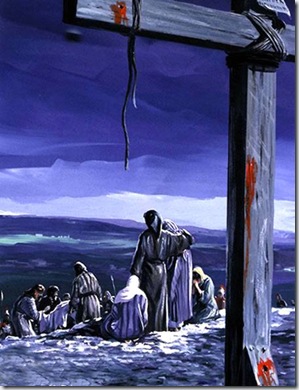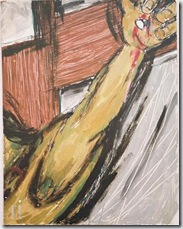Meanwhile Jacob had settled down where his father had lived, the land of Canaan. 2 This is the story of Jacob. The story continues with Joseph, seventeen years old at the time, helping out his brothers in herding the flocks. These were his half brothers actually, the sons of his father’s wives Bilhah and Zilpah. And Joseph brought his father bad reports on them. 3-4 Israel loved Joseph more than any of his other sons because he was the child of his old age. And he made him an elaborately embroidered coat. When his brothers realized that their father loved him more than them, they grew to hate him—they wouldn’t even speak to him. Genesis 37, The Message
 I have read the story of Joseph and his “technicolor dream coat” many times. As I read it, my mind has in view a snapshot of a fancy, multicolored striped tunic just like the ones I saw in the Sunday School pictures.
I have read the story of Joseph and his “technicolor dream coat” many times. As I read it, my mind has in view a snapshot of a fancy, multicolored striped tunic just like the ones I saw in the Sunday School pictures.
Recently while listening to a lecture by Dr. Doug Stuart, he pointed out that Genesis 37 is not telling the story of a little boy with a coat of many colors but is communicating that Jacob gave Joseph a long-sleeved coat.Â
For the reader, that was to signal that an inheritance ceremony was going on in this family. The long sleeved coat was normally given to the first born son symbolizing that he was the heir who would receive the double portion from the father.Â
The Genesis story is highlighting how upside down Jacob’s affections were for Joseph. As Jacob awards a younger son this great gift of inheritance, our hearts immediately resonate with the brothers who felt slighted and disowned by father Jacob.
Is there something else –something more hidden going on in this story? Was the author’s intent not only to shock the hearer with the sense of unfairness but also with how undeserving was Joseph for such a generous gift. Â
Running all through the Bible narrative, the Holy Spirit is weaving the tapestry of grace. So too in this family history, the author is pulling a “grace thread’ through the fabric of jealousy, hatred, and undeserved favoritism. The thread becomes clearer if we will stand in Joseph’s shoes rather than in the shoes of the offended brothers. Tim Keller is masterful in getting at the “grace thread” of Genesis 37. Â
“Suffering all by itself can ruin you, but suffering plus an absolute assurance of the love of God can turn you into something great, absolutely great. Well some of us say, “That’s nice, except that’s not what happens is it?â€Â Because when bad things come in your life, you know what happens:
When suffering comes into your life, almost immediately you struggle with this, you say “Maybe I am not living right. Maybe I am not doing right.†When suffering comes into your life, you have less assurance that God loves you. You feel like “God has abandoned me,” so how the heck is this going to work? It doesn’t make sense. Â
If George Herbert is right in saying, “If I had joyous coat, if I had the coat of the Father on me, then suffering I can handle it.” How do you get it? Here’s how you get it. The pattern of salvation in Joseph’s life was so weird to his brothers. It’s so against the world’s thinking, but that is because it points to the ultimate pattern of salvation. Â
You see, centuries later another one came to his brethren, “to his own and they received him notâ€. Another one was sold for silver, and betrayed by the people closest to him. It was another one who was stripped naked, and abandoned to die, and who cried out in the dark, “Why?†And nobody heard. Nobody came. That one was Jesus.
But here’s the difference: Joseph is being turned into a savior, the only way God’s salvation would have worked; Jesus was being turned into a savior through weakness in suffering and rejection. You see that? Joseph can only save the community if he is first rejected by the community, he could never be their savior – though eventually he was – unless he was first lost, unless he was humbled, unless he was rejected, unless he was sold.
Joseph was being turned involuntarily into the savior for one human family. But Jesus Christ came, and the pit he fell into was vastly deeper. And the cry of his dereliction was vastly greater. And his nakedness and his sense of abandonment was infinitely beyond anything that Joseph went through. In other words, Jesus came voluntarily to be the savior of us all.
 Because when Jesus was on the cross, He wasn’t just physically naked. He was stripped of His Father’s love. Do you know why? He was being punished for our sin. Â
Because when Jesus was on the cross, He wasn’t just physically naked. He was stripped of His Father’s love. Do you know why? He was being punished for our sin. Â
When suffering hits you, you will always get back in touch with the subliminal deep profound sense – that every human being has – and that is “I really deserve some punishment for the way in which I’ve lived”. No human being can get rid of that. I don’t care how much therapy you go to. It’s there. It’s cosmic. It is part of “the image of God”, part of who you are as human being.
And when suffering comes, you will lose any sense of God’s love unless you see: here is “The One” who lost the Father’s coat, so you can be assured that you have it. Here is The One who lost the Father’s love, paying our penalty so we could know – in spite of our imperfect life – God loves us.
When I ask God to accept me because of what Jesus has done, I get the coat. I know He loves me.
And if you know that, that means if right now today you’re in the pit and you’re crying out in dereliction, you cry out “Why am I completely alone?” You’re not. Because Christianity is the only religion that even claims that God has suffered, that God has gone into that pit. That God is there. God has also gone in there in the dark besides you. He knows what it’s like! He’s suffered with you. God suffered for you! He did! So you’re not alone. You can know, even in the midst of your suffering, that He loves you. And that’s what you actually need.
Let’s pray. Father show us how we can have – in our life – this coat: The assurance of Gods love; the assurance of Your love, Father; the assurance of your adoration and delight of us. And we pray that if we have that, we’ll be able to turn even suffering into joy. We will turn even our troubles into wisdom and holiness. And we ask that you show us how to do that. Here, as we take the Lord’s Supper, make yourself real to us. In Jesus name, Amen.” ((Tim Keller, The Hiddenness of God, Redeemer Presbyterian Church, NYC, June 2003))
 Harry W. Schaumburg wrote a blog post entitled “Sexual Sin in the Ministryâ€.  He makes a strong case that our “diagnosis determines the treatment†and suggests that nothing short of the cross will heal people caught in sexual sin.
Harry W. Schaumburg wrote a blog post entitled “Sexual Sin in the Ministryâ€.  He makes a strong case that our “diagnosis determines the treatment†and suggests that nothing short of the cross will heal people caught in sexual sin.



